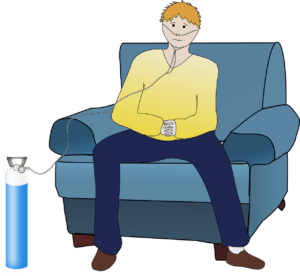Bronchitis is a medical term used to describe a health condition that usually falls between a common cold and pneumonia. Below we look at bronchitis treatments, symptoms and types/causes of bronchitis.
Bronchitis happens when the air-carrying tubes in the lungs (aka the bronchioles) are inflamed. When the bronchioles are inflamed, they make too much mucus. Chronic bronchitis is a type of chronic obstructive pulmonary disease (COPD) defined as a cough of more than 3 months occurring within the past 2 years.
Bronchitis Symptoms
Symptoms of bronchitis can include:
- A persistent, mucusy cough
- Wheezing
- Tightening of the chest
- Fever and chills
- Body aches
- Headaches and/or body aches
Types of Bronchitis and Their Causes
There are two types of bronchitis: chronic bronchitis and acute or short-term bronchitis.
First, chronic bronchitis is when a person has a cough that persists for three months out of the year for at least two consecutive years. Common causes of chronic bronchitis may include a respiratory infection, and exposure to second-hand smoke or other irritating substances. It can cause obstruction to the airflow and is often grouped with chronic obstructive pulmonary disease or COPD.
Next is the acute or short-term bronchitis. This is usually due to a viral infection that worsens because of smoking. It can last anywhere from 10 to 14 days, but symptoms can last for up to three weeks.
Acute bronchitis is a contagious illness, but if you have taken antibiotics, you usually stop being contagious after 24 hours. However, for those patients who experience a viral form of bronchitis, then antibiotics are not the proper medication. In this case, you will remain contagious for a few days up to a week.
Bronchitis Treatments
Treatment for bronchitis varies and will depend on what type of bronchitis you have. For those who have acute bronchitis, there is not much they need in terms of medical treatment. It usually goes away after a few days. For the most part, patients with acute bronchitis can just take over-the-counter medications for the mucus, for the fever or the pain.
However, for those who have a bacterial infection, then it’s a different scenario. Doctors may prescribe antibiotics.
Treatment for chronic bronchitis is also different. Since it is considered as a COPD, it is not curable.
Treatments you can get to manage the symptoms include using medication, oxygen therapy, surgery, pulmonary rehabilitation or a combination of two or more of these treatments.
If you suspect that you, or someone you know has bronchitis, it is important to seek medical help immediately to prevent contagion and further progression of the disease.







